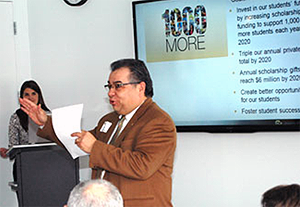CU Denver’s largest-ever scholarship initiative fosters student success regardless of background
Raul Cardenas, associate vice chancellor for Student Affairs, announces the 1,000 More scholarship initiative at CU Denver.
One thousand more.
CU Denver's goal of fostering student success regardless of background is behind our largest-ever scholarship initiative.
Raul Cardenas, Ph.D., associate vice chancellor for Student Affairs, announced the 1,000 More scholarship initiative at the annual campus showcase luncheon on Friday. CU Denver hopes to provide financial support for 1,000 more students every year, and triple private support for scholarships by 2020.
Cardenas said Colorado spends less than half today on higher education than it did 13 years ago. The reduction of state support has been especially significant at CU Denver, where more than 60 percent of our undergraduate students have financial need.
"Most CU Denver students already have the critical elements for success -- they're coming in with academic ability, they're coming in with a strong work ethic, they're coming in with dreams," Cardenas said. "We really need private support to help our students realize those dreams."
The students CU Denver serves are diverse -- a third of them are students of color -- and "look like the state," Cardenas said. Of the record 1,157 freshmen enrolled this fall, a third are first-generation college students and a third of them are low-income.
"But while our enrollment has climbed, state financial support has declined," he said.
Both need-based and merit-based scholarships are priorities during 1,000 More, as well as scholarships for international students, study abroad opportunities, transfer students, and graduate students. CU Denver, which recently launched "Learn with Purpose," its first-ever comprehensive advertising campaign, awards more master's degrees than any public higher-education institution in the state.
"It would be so tremendous if we can give students that additional resource and that additional opportunity for success," Cardenas said.
By 2020, CU Denver's goal is to be awarding students $6 million in scholarships from private philanthropy. Watch a video about how scholarships have helped current CU Denver students achieve their dreams here.
Matt Wasserman, vice chancellor for development at CU Denver, said scholarship support holds the key for much of what CU Denver wants to accomplish. "It creates better opportunities and a better future for our students, it grows our campus by increasing enrollment and allowing us to recruit the best and brightest, and it leads to positive impact on our community."
Kelly Cronin, vice president for advancement for the University of Colorado, said the university is "taking fundraising to new heights" at all four of its campuses. "You are all here because clearly you care -- whether you're a donor or an advocate or a friend of the campus," she said. "We're so grateful for all that you do."
The showcase event, in the newly renovated second floor of the College of Architecture and Planning, included presentations by Mark Safty, new Timothy E. Wirth Chair in Sustainable Development, and Robin Shandas, Ph.D., founder and chair of the Department of Bioengineering and professor of pediatrics and surgery.
Wirth Chair in Sustainable Development
Safty said sustainability is a "word that makes people feel right," and is, at its core, an ethical ideal. "It's an ethical concept of how we should live, develop, work, travel, eat and dispose of our waste," he said. "It's a series of ethical considerations that need to be understood and taught."
The Wirth Chair in Sustainable Development, established in 1993 and housed within the School of Public Affairs, seeks donations in order to continue the teaching and outreach that has defined the Chair since its endowment by former U.S. Sen. Tim Wirth. For students, the program wants to create transformative opportunities, "light candles of inspiration," and create subsequent action, Safty said.
"We can foresee in the next couple of years sponsorship and program needs in the range of about $250,000," he said. "Our larger goal in the next two years is we'd like to double the size of the endowment created by Sen. Wirth and continue his legacy in his name to become a state and local leader in the field of sustainability."
Department of Bioengineering
Shandas explained how CU Denver's innovative Bioengineering Department came about. He began developing the program seven years ago after he kept hearing students say, "Do you have a bioengineering program here?" CU Denver started with a graduate program in 2010, and this year matriculated its first class of undergraduate students (27).
The closest similar programs are in Salt Lake City to the west and St. Louis to the east.
"I thought there was a really good opportunity to capture, both within Colorado and the Rocky Mountain Region, a group of students who could stay here and contribute to bioengineering," Shandas said. "Our mission is to improve human health through the application of engineering principles, ideas, methods and inventions."
Shandas said CU Denver's program is one of the most competitive bioengineering programs available. It's a field that offers high-paying and plentiful employment opportunities to graduates.
"This program attracts very, very bright students, but we'd love to have scholarships for these students and really entice the best and brightest to come here and study," he said. "There is substantial opportunity to really build this program."


